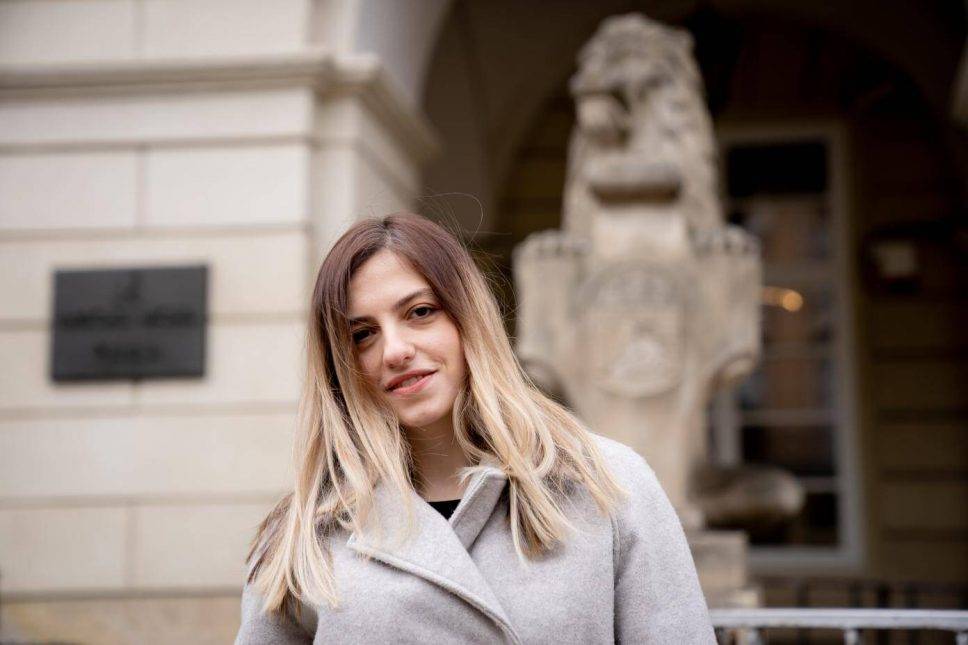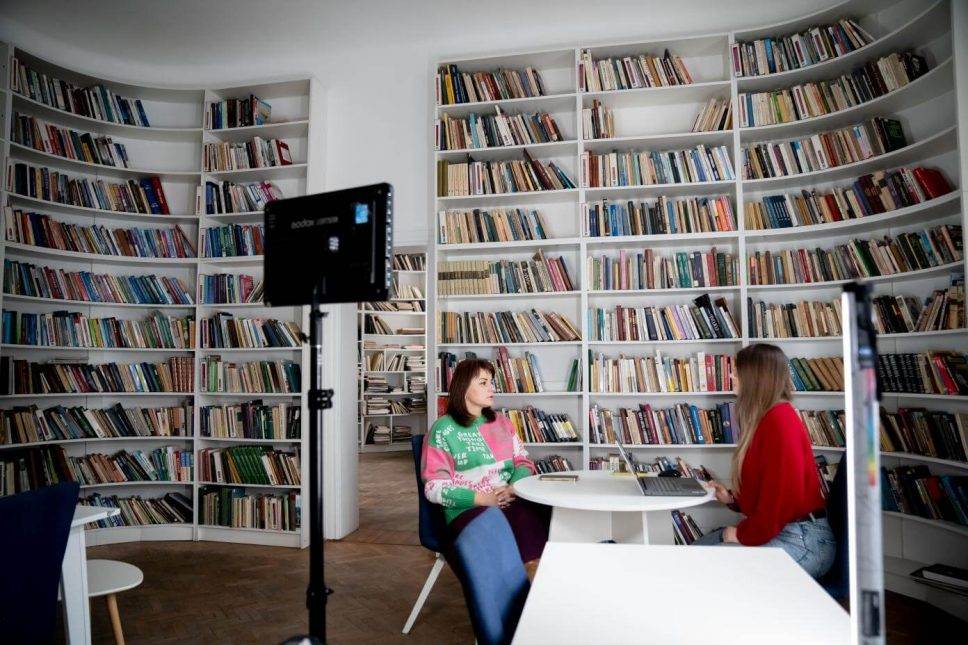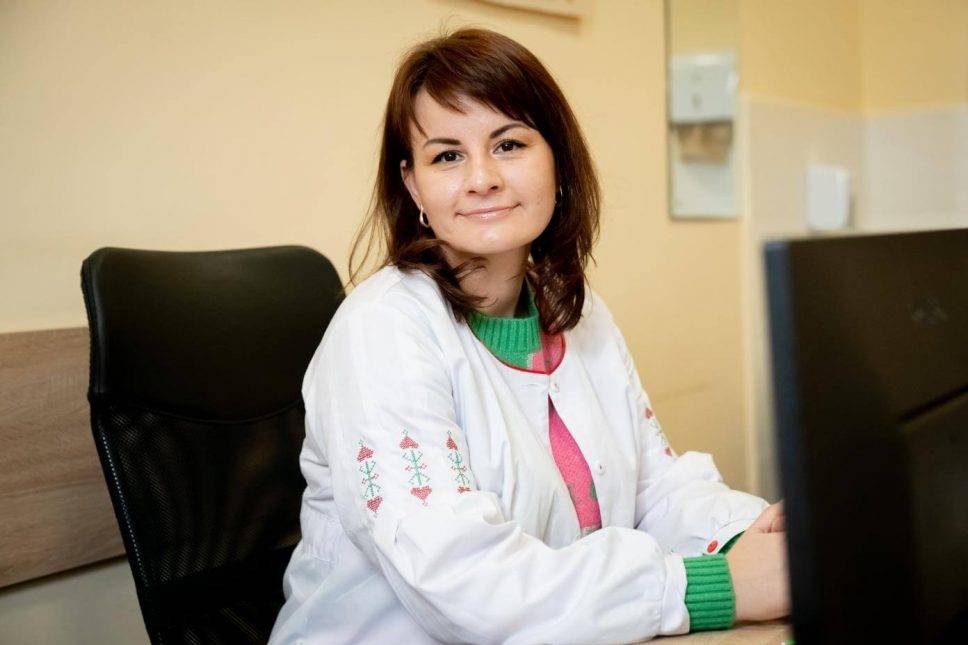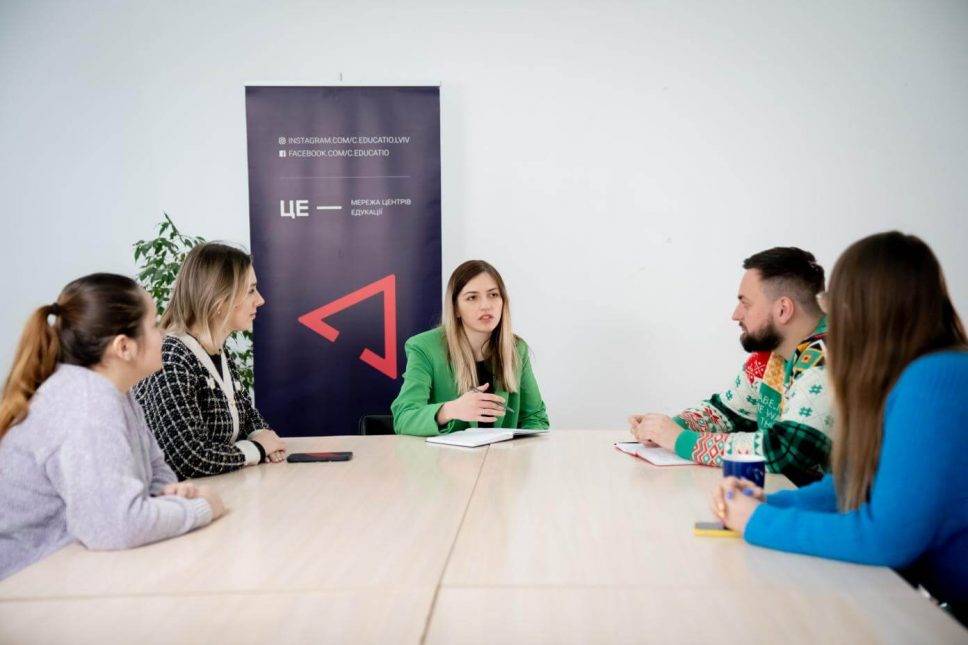
Libraries as centers for informal learning for IDPs in Lviv
10/04/2023
According to the City Council, more than 200,000 internally displaced persons moved to Lviv in the first four weeks after Russia’s full-scale invasion of Ukraine. Many lost their homes, family, friends, and jobs. Soon after these people had found refuge, they started looking for a safe environment and employment. Since March 2022, the non-governmental organization “Merezha Centriv Edukatsii” / “Network CE” (“Network of Education Centers”) has focused on supporting internally displaced persons as Viktoriia Furhalo and Anastasiia Nechyporenko founded it four years ago to introduce systemic non-formal education in Lviv. Thanks to the EU4Dialogue grant from the European Union and the United Nations Development Programme (UNDP), “Merezha CE” is turning Lviv libraries into informal centers for acquiring new knowledge and starting a new profession for IDPs.

“Non-formal education is an excellent way of socializing and promoting social cohesion”
Viktoriia Furhalo, the co-founder of the non-governmental organization “Merezha Centriv Edukatsii”/ Network CE
Three air raid sirens went off in the morning in the heart of Lviv, and then, the all-clear sounded. Many people crowded the city center to give their last honors to the fallen Ukrainian defenders.
Viktoriia Furhalo, the co-founder of the NGO “Network CE” who also works in the “City Institute,” a communal organization run by the Lviv City Council, meets us by the entrance to the Lviv Town Hall at the Market Square.
“There were many IDPs in our city after the invasion, and all these people needed to integrate into the local community. Many of them came to Lviv for the first time. For us, it is crucial to maintain the concept of a city that learns at every step,” says Viktoriia Furhalo.
Viktoriia Furhalo and her colleague Anastasiia Nechyporenko founded the NGO “Merezha Centriv Edukatsii” (“Network CE”) in 2021 to introduce systemic non-formal education in Lviv. After the full-scale invasion, they focused on supporting internally displaced people. “Network CE” runs various training courses in Lviv libraries, from first aid courses to foreign languages and graphic design. Thus, libraries have turned into centers for informal education.
“We believe that non-formal education is an excellent way of socializing and promoting social cohesion. Some of our courses also attend people who run their businesses and unemployed immigrants from the job center. They work together in groups, create joint projects and communicate and help each other after finishing our courses,” says Viktoriia Furhalo.
In the summer of 2022, the NGO received support from the EU4Dialogue project, funded by the European Union and implemented by the United Nations Development Programme. In te project’s framework, despite the lack of electricity and frequent air alarms, the team managed to hold seven courses, six webinars, 48 speaking club events, and a festival. More than a third of the participants were internally displaced persons.
“This is our first cooperation with UNDP,” explains Viktoriia Furhalo. “We instantly realized that their principles resonate with our activities as we read about this grant programme on their website. I am happy that people without a job or motivation often get employed after finishing courses run by us. Thanks to this cooperation, we also developed a program for legal support, especially for displaced people.”
“I could not say a single word during the first lesson; I was too timid. With the support of the teachers and other participants, I started to improve”
Kseniia Moskalenko.
Kseniia Moskalenko is 17 years old and a first-year student at V. I. Vernadsky Taurida National University [based initially in Simferopol, Crimea, now relocated to Kyiv]. She was born in the village of Kalynove, Donetsk oblast, which is now constantly shelled. Since the beginning of the full-scale invasion, Kseniia has lived in a modular town in Lviv and now attends English language courses at the “Network CE.”
“Thanks to ‘Network CE’ I improved my speaking skills, which is very important. I could not say a single word during the first lesson; I was too timid and aware that my English was not perfect. Still, with the support of the teachers and other participants, I started to improve,” says project participant Kseniia Moskalenko.
One of the “Network CE” centers is near the modular town where Kseniia lives. She needs English for her future work in the hospitality industry.
“The labor market is currently in crisis. Many people are losing their jobs, and many are leaving the country. Non-formal education will help to adapt to these dramatic changes quickly. One can acquire new professions and social skills,” stresses Viktoriia Furhalo. “Individual success stories inspire me the most. For instance, some people get immediately employed during a design course. There are cases when one person saved another’s life after our first aid courses. What could be better in your work than a saved life?”.

There are wall-mounted shelves where each book is in its place and niches with pillows and light blankets for cozy reading; soft multi-colored chairs and armchairs, which we used to see in coffee shops rather than libraries. There’s lots of light, greenery, and space.
Ten years ago, the library concept in Lviv has been changed. It is no longer a book collection that scares visitors away with dust, creaky floors, and post-Soviet “charm.”
Viktoriia Furhalo first saw the library being used as a venue for informal education in Germany. She firmly believes modern Lviv libraries are the best place for exchanging ideas and learning with adults and children.
“University libraries in Germany are great for studying. The concept of non-formal education suits libraries best; it is a powerful resource,” says Viktoriia Furhalo.
During 2022, nine out of forty-four Lviv public libraries have become centers for informal education as a part of “Network CE.”
“At the first meeting, I usually ask our students which of them has been to a library before. As a rule, 80 percent admit they came for the first time. After finishing our courses, graduates return to libraries with their children and families. We use the available technical base of libraries for non-formal education to conduct training there. This way, we don’t need to build educational centers from scratch and save money and resources,” says Viktoriia Furhalo.

“It is important for me to be useful. I find meaning in life when I am needed. I feel I am in the right place—this gives me the strength to live on”
Olha Kitura
We meet Olga Kitura in the URBAN library, part of “Network CE”. Before joining Viktoriia Furhalo’s team, she was the head of the Center for Mental Health at the Metropolitan Andrei Sheptytsky Hospital. She has taught psychology within a non-formal education programme for several years.
“I texted Olga on Facebook once and offered a pilot course within our activities. We chose the most experienced for our pool of trainers, and I knew she often participated in public events and festivals. Together, we developed a course in practical psychology,” says Viktoriia, reminiscing about how she first met Olha.
Volunteering and teaching Olha Kitura combined with medical practice. Putting on a white coat, she transforms into a psychiatrist with 15 years of experience.
Being a military spouse, Olga Kitura holds her front coordinating art therapists who work with children in the Lviv oblast within one of the NGO “Merezha Centriv Edukatsii”/ Network CE projects.
“It was an incredible volunteering experience. We always aimed to make a true holiday for kids, and they were happy and asked when we would come again. Although the work was very intensive, their words are the most valuable gratitude for us,” says Olha.
After the victory of Ukraine, Olha Kitura plans to continue working at the hospital and combine it with teaching.
“It is important for me to be useful. I find meaning in life when I am needed. I feel I am in the right place—this gives me the strength to live on,” adds Olha Kitura.

The NGO “Merezha Centriv Edukatsii” / “Network CE” (“Network of Education Centers”)is one of the organizations that received support within the program “Response of civil society to the needs of women and men, especially those living in hard-to-reach places and representatives of vulnerable groups” of the EU4Dialogue program of the European Union and the United Nations Development Programme (UNDP).
Author: Marharyta Lubkova
Photo: Artem Poznanskyi
Stories
-
Katarina Mathernova: If Ukraine had a human face and a human spirit, it would be 10-year-old Roman Oleksiv
-
A regional mission to drive social entrepreneurship: the story of Ksenia Kosukha
-
EU restores safe water supply for 100,000 Ukrainians affected by war
-
Promoting IT during the war: Lviv IT cluster and how EU4Digital helps
-
Frontline digitalisation: Kharkiv IT Cluster collaborations
-
How EU4Youth is driving opportunity and success among young Ukrainians